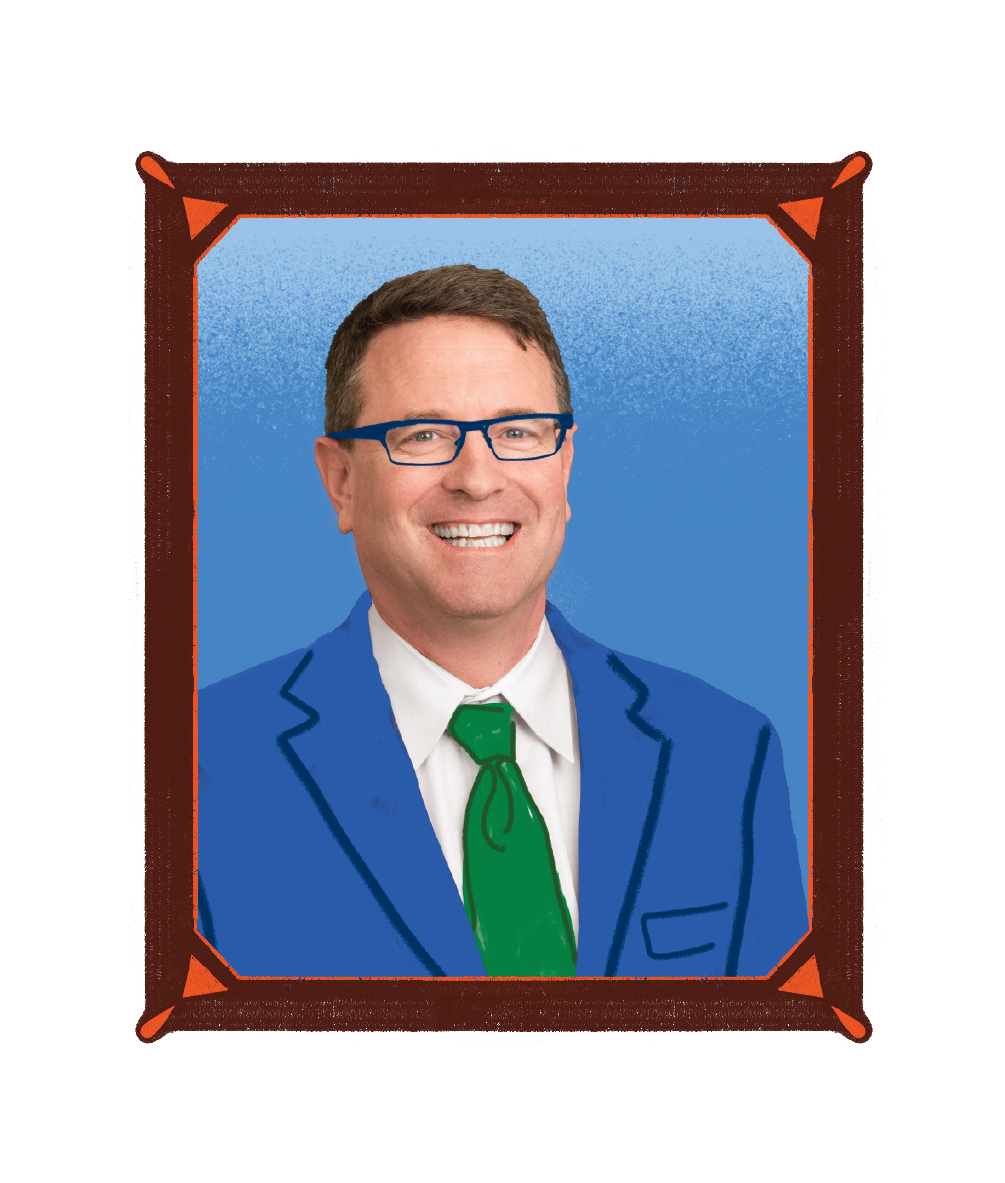Living fuller lives

Finding innovative ways to foster purposeful living and positive social connections
Story by Claudia Capos
Illustrations by Katie Spak
Today, Americans of all ages are struggling with loneliness, social isolation, anxiety and depression. Their numbers are increasing at a concerning rate.
In 2023, one in three adults ages 50 to 80 reported they felt socially isolated from others, lacked companionship, and had infrequent contact with family, friends or neighbors outside their home, according to the University of Michigan’s National Poll on Healthy Aging. Measures of loneliness and social isolation were even higher among those with physical and mental health conditions.
Young adults in their teens and 20s are grappling with equally serious issues, including anxiety, depression and addiction. During the last two decades, youth suicide has increased significantly. From 2007 through 2021, the suicide rates for Americans ages 10 to 24 rose 62%, according to the US Centers for Disease Control and Prevention.
Last year, Dr. Vivek Murthy, the US Surgeon General, released an advisory calling attention to what he termed “the public health crisis of loneliness, isolation and lack of connection” in America. He laid out a framework for a national strategy to “build a country that’s healthier, more resilient, less lonely and more connected.”
Researchers at the University of Michigan School of Public Health recognize these challenges can affect the long-term mental and physical health, well-being and longevity of individuals as well as society.
Collaboratively, they are studying the underlying risk factors for loneliness and social isolation, and developing innovative tools and approaches to address this worsening threat to public health.

Unlocking the power of purpose
Victor Strecher, professor of Health Behavior & Health Equity, is helping people live fuller, more purposeful lives by helping them change their behavior.
Over the last 15 years, he has demonstrated—both in his lab and his personal life—that individuals can improve their quality of life and emotional well-being by embracing a strong sense of purpose to guide them through the ups and downs of everyday living.
Strecher defines good health as the degree to which people are flourishing and generative rather than simply as the absence of disease and death.
“I believe the key to reaching these good-health goals is having a transcendent purpose in one’s life and, more important, being purposeful,” he said. “Bringing your best self to that purpose and being intentional every day will give you hope and direction in life and help you thrive.”
In 2010, Strecher himself experienced profound grief and depression following the sudden death of his 19-year-old daughter, Julia, a freshman nursing student at the University of Michigan. On Father’s Day that year, he left his family’s cottage in northern Michigan at 5:15 a.m., paddled his kayak two miles out into Lake Michigan, and contemplated his options: keep paddling into a watery abyss or return to shore.

As the sun rose, Strecher could almost hear his daughter’s voice urging him to overcome his grief and start living his life in a new way. He paddled back to his cottage and began writing down the core values that mattered most to him: his family, his research and his students. Those values became his focal points of purposeful living.
Strecher’s personal revelation not only saved his life that day, but also inspired his research, teaching, writing and public speaking. He has written two books on purposeful living and developed a free online course on the topic. Strecher also has launched a purpose-inspired, well-being platform called Kumanu and created a “Purposeful” app to encourage users to define their personal purpose.
Research studies by Strecher and his colleagues have shown that having a greater sense of purpose not only increases feelings of emotional well-being, but also can affect how DNA expresses in the body, leading to actual physical health improvements.
“People with strong purpose end up, on average, living longer and are less likely to develop certain diseases or to be depressed,” Strecher said.
In a study conducted during the COVID-19 pandemic, Strecher and his research team tested a sample of 1,572 older adults (mean age 70 years old) drawn from the University of Michigan Health and Retirement Study to determine whether psychosocial resilience factors, such as a sense of purpose, might reduce age acceleration in the epigenome—chemical modifications within a cell that regulate gene expression.
Epigenetic clocks, created by machine-learning algorithms, reflect DNA alterations and other cellular and molecular changes that occur with age. Researchers use epigenetic clocks to gauge the effects of aging and social disparities on the biological processes that affect late-life disease and disability.
Stress and life adversity can inflict “wear and tear” that may speed up a person’s epigenetic clock, causing their biological age to accelerate beyond their chronological age.
People with strong purpose end up, on average, living longer and are less likely to develop certain diseases or to be depressed.”
— Victor Strecher
In effect, these people “grow old before their time.”
Strecher’s team found that older adults with a high sense of purpose in life showed “younger” epigenetic age acceleration, particularly in the areas related to health and longevity. Their results suggest there may be new opportunities to reduce biological age acceleration by encouraging purposeful living.
In a related study, Strecher teamed up with University of Michigan psychology professor Ethan Kross to consider how a sense of purpose is associated with different emotion-regulation strategies for coping with anxiety across the adult lifespan. They collected online survey data from 1,666 participants ages 18 to 99 who responded to questions about their sense of purpose, anxiety symptoms and strategies for regulating their emotions.
Strecher and Kross’s analysis revealed that individuals with a higher sense of purpose reported utilizing strategies that aligned closely with the needs of leading a goal-directed life. Sense of purpose was most strongly associated with reframing and reappraisal-oriented strategies for emotion regulation.
Listen to "Vic Strecher: Living with a greater sense of purpose" on Spreaker.
“When they felt anxious, people with a higher sense of purpose were more likely to find a silver lining, focus on the big picture, and remember that the stressor will not last,” the two researchers wrote.
Such individuals also were less likely to fall back on unhealthy coping strategies such as eating and drinking, hiding or holding back emotions and distraction.
Strecher and University of Pennsylvania neuroscientist Emily Falk, who was formerly on the University of Michigan faculty, have used magnetic resonance imaging (MRI) to study an area of the brain, known as ventromedial prefrontal cortex, which is associated with self-related processing, future orientation and regulation of emotions. The two researchers observed increased activity in that brain area when they asked participants in their study to think about their purposeful core values.
Strecher’s long-term goal is to help one billion people around the globe find greater purpose and direction in life, so they can gain a sense of personal fulfillment and preserve their health and happiness as they age.
“If we can do that, we might be able to make a lasting impact on the public’s health and well-being,” Strecher said.
LEARN MORE about Michigan Public Health.

Examining the risks of persistent loneliness
Lindsay Kobayashi, the John G. Searle Associate Professor of Epidemiology, began studying the health impacts of loneliness early in her academic career.
Her work took on greater urgency during the COVID-19 pandemic when people felt cut off from meaningful relationships and supportive social interactions for months and even years.
Two of her recent studies have revealed some important insights into how persistent loneliness over an extended period poses risks for long-term mental and physical health.
Both studies analyzed 20 years of data on 9,032 adults age 50 and older in the University of Michigan’s Health and Retirement Study from 1996 to 2019. The research team adjusted for a wide range of possible underlying causes of loneliness, such as depression and chronic illness, allowing them to focus exclusively on loneliness itself.
“My team’s research results on cumulative loneliness showed that the longer people experience loneliness as they age, the greater their rate of memory decline in later years,” Kobayashi said.
Women and adults age 65 and older were more likely to have a faster rate of memory aging than men and younger adults, according to the research findings.
Listen to "Loneliness is a public health issue: Let’s tackle it together" on Spreaker.
In a second study, Kobayashi and her team found that individuals who felt persistent loneliness in middle age and later life also faced a greater risk of mortality.
Study participants who said they experienced loneliness at one, two or three or more time points over an eight-year period had a higher risk of mortality than those who never reported feeling lonely. These results corresponded to 106, 202 and 288 excess deaths, respectively, per 10,000 person-years of follow-up.
“Treating loneliness, as well as social isolation, as a public health issue is incredibly important for population health,” Kobayashi said. “This issue needs to be addressed at a societal level to enable people to have various types of social connections with others in their community.”
Kobayashi suggests possible interventions, such as creating walkable neighborhoods and designing public spaces where people can go to socialize.
“Online communication, when done right, also can be a valuable supplement to in-person connections,” she said.

Connecting people through SPEAK!
John Piette’s dual role as a professor of Health Behavior & Health Equity at Michigan Public Health and a health-services researcher at the US Department of Veteran Affairs has brought him into close contact with older adults and US military veterans. Many of these individuals are grappling with depression and anxiety, which often reflects loneliness and lack of positive social connections.
“Health systems are often very good at treating people from a clinical/medical-model perspective,” Piette said. “But they are not necessarily good at helping people from a public health perspective to find purpose and meaning in life.”
Piette’s extensive public health work with Hispanic populations in Latin America has raised his awareness of yet another unmet need—the need among recent non-English-speaking immigrants in the United States to practice speaking English and to learn more about American life and customs.
“People from Spanish-speaking countries often come to me and say they can understand English, but they don’t feel comfortable speaking it,” said Piette, noting that more than 50 million people in the US speak a language other than English in their homes. Lack of fluency in English can limit their job prospects, social integration and upward mobility.
In 2019, Piette saw a great opportunity to bring together these two populations—people lacking meaningful social contacts and people wanting to improve their English fluency.
Health systems are often very good at treating people from a clinical/medical-model perspective. But they are not necessarily good at helping people from a public health perspective to find purpose and meaning in life.”
— John Piette
SUPPORT research and engaged learning at Michigan Public Health.
He created and piloted SPEAK! (Seniors Promoting English Acquisition and Knowledge). The eight-week online program uses videoconferencing to connect older adults and military veterans who serve as volunteer “coaches” with English-language learners seeking to gain greater confidence and ability to speak English.
“The program was intended to increase purposeful social connections among ‘coaches’ struggling with their moods and mental health and give them a safe opportunity to have a purposeful, positive conversation with someone else,” Piette said.
The early success of SPEAK! far exceeded his expectations.
“The results of our initial evaluation were very gratifying,” Piette said. “Both the ‘coaches’ and English-language learners really enjoyed it, and many said they planned to keep in touch beyond the eight-week pilot period.”
After the program concluded, military veterans showed marked improvements in their mental health. The percentage of those with depression dropped from 62% to 39%, and the incidence of anxiety fell from 39% to 19%. Symptoms of post-traumatic stress disorder, or PTSD, also decreased significantly.
Piette is continuing to pursue SPEAK! with the VA Healthcare System. He also is exploring opportunities to grow the program within multinational corporations, such as Hilton Worldwide Holdings and McDonald’s Corporation, which hire large numbers of employees who do not speak English as their primary language.
Supporting public health research
The work of developing innovative ways to address pressing public health issues, such as loneliness and social isolation, inevitably falls on academic researchers at universities rather than on HR teams at public and private business corporations.
“The private-sector marketplace, as well as advocacy organizations, are waiting for evidence regarding the program’s value before they invest—and academic researchers can provide that evidence,” Piette said.
“That’s why it is essential to support university-based researchers who have the time and creativity to develop and refine programs, such as SPEAK!, which are not immediately profitable. Otherwise, these initiatives would never find their way out into the broader world.”
